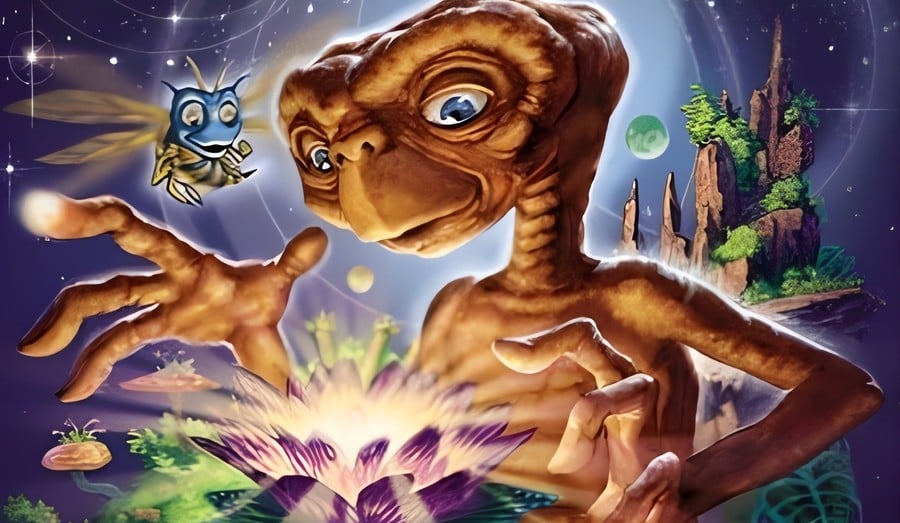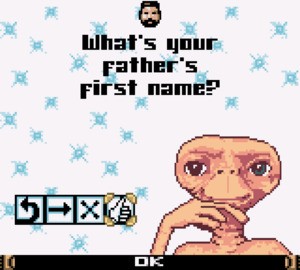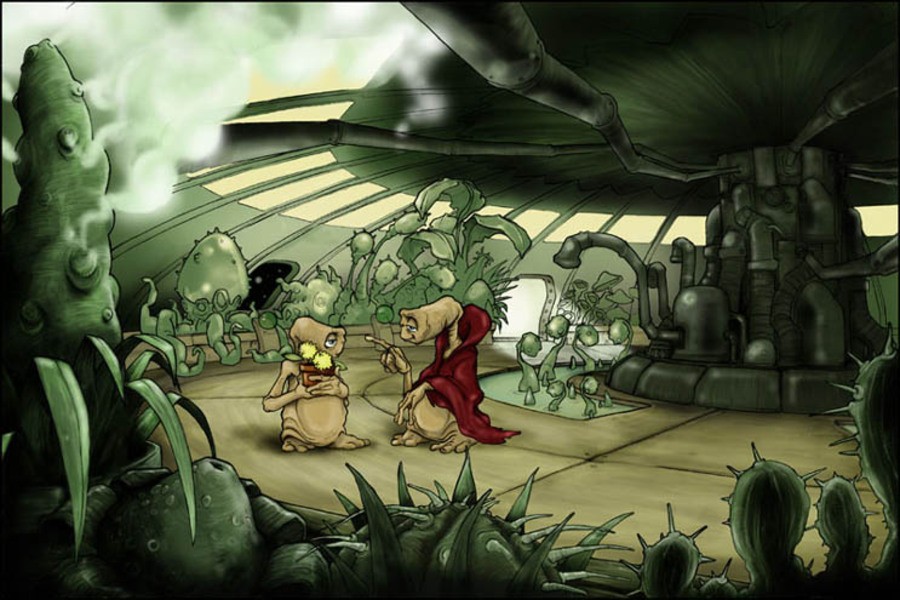
If you have even a passing interest in video game history, you've probably heard the story of Atari's disastrous E.T. adaptation, which saw unsold copies of the game being buried out in the New Mexico desert and blamed as one of the contributing factors to the 1983 North American video game crash. Something that's a little less well known, however, is that almost twenty years after, another company gambled on the popular alien — again to disastrous results.
In the year 2000, NewKidCo, a New York publisher of low-budget children's games, took a risk by obtaining the license for E.T. for an amount now estimated to be in "the millions". Its plan was to produce a bunch of video games based on the iconic alien, hoping to capitalize on the film's 20th anniversary, happening in 2002, but things didn't go exactly as expected. The publisher soon overstretched itself with the number of licensed games it was creating and quickly ran into financial difficulties.
This had a devastating impact on the company and its development partners, resulting in the cancellation of three E.T. projects (Search for Dragora, Return to the Green Planet, and The Salerian Encounter/Venrom's Assault), and the end of NewKidCo as a publisher.
It's a story I've covered before in the past, but recently we decided to do a bit more digging and speak to more people who were actually involved with the development of these games. As a result, we were able to find out more about the 20th-anniversary celebrations, what went wrong, and the games that never saw the light of day. What follows is the complete story of how the publisher NewKidCo gambled a fortune on E.T., and how the franchise's curse claimed another victim.
The E.T. Deal
The story begins in 1997, when Hank Kaplan, the founder and former chairman of Hi-Tech Expressions and ex-president of Phillips Media, started NewKidCo alongside former Hi-Tech Expressions and Acclaim producer Dan Feinstein, and Jonathan Harber, the president of the educational software company KinderActive.

Similar to Kaplan's previous company Hi-Tech Expressions, the idea behind NewKidCo was to try and fill a gap in the market, leveraging existing licensing relationships with popular brands, like Tom & Jerry and Sesame Street, to create affordable video games for children on widely-accessible platforms. For a while, it all seemed to be going well, with the publisher securing funding from investors, winning awards, and signing lucrative partnerships with Ubisoft for international distribution. Then in the early 2000s, Kaplan came up with an idea that would ultimately end up being the company's undoing.
With Spielberg's E.T. turning 20 in the Summer of 2002, Kaplan wanted to acquire the license to the iconic film and its sequel novel, The Book of the Green Planet, to produce a string of games for handhelds and home consoles. Obviously, with the specter of Atari's E.T. looming over the license, not everyone at NewKidCo was enthusiastic about this idea.
Seth Rosenfeld, a former senior producer at NewKidCo, told Fanbyte in 2021, “When the prospect came up with the producers, our first thoughts were of the Atari game fiasco and disbelief that we would commit to the number of games we promised. Danny told Hank he was crazy for putting all his eggs in one basket and told him he should have gone after Harry Potter — Hank hadn’t even heard of it.”
Feinstein expanded on these concerns when talking to Time Extension last year: "At the time I was pushing for Harry Potter and another title or two that I thought were strong and were going to go someplace. When E.T. came out, I thought it was great. I thought it was a great flick, but when Hank brought it up so many years later as a potential title for a game it sounded off alarms. I couldn't get passionate about it. It was too old and at that time, it was a forgotten movie to kids."
Despite these reservations, NewKidCo pushed ahead with its E.T. plans on November 27th 2000, announcing the licensing deal on its website:
"The Company is already in development on multiple titles for multiple platforms for launch in 2001, based on Steven Spielberg's E.T. the Extra Terrestrial. E.T. is Universal Studios' largest grossing film in their history and is scheduled for a 20th anniversary theatrical re-release in the Spring of 2002 that will include never-seen-before footage as well as state-of-the-art computer generated enhancements of the original Oscar winning visual effects. The Company is planning a full line of E.T. games for PlayStation One, the new PlayStation 2; Game Boy Color, the new Game Boy Advance and Game Cube and Microsoft's "X Box" as part of its 2001- 2002 line up."
NewKidCo planned to start off small, releasing a bunch of minor handheld titles first, before publishing increasingly more complex and expensive games for PC, PlayStation, PlayStation 2, GameCube, and Xbox. These weren't all based on the same design, as you might imagine, instead spanning multiple genres and stories, inspired by the film and its sequel book from author William Kotzwinkle.
In a press release, dated May 14th, 2001, Kaplan expressed his excitement about the deal:
"We are very pleased and excited by the opportunity to work with Universal Studios and Amblin Entertainment to reintroduce this perennial favorite through the new interactive technologies. Few movies have inspired laughter and tears to billions around the world, as much as E.T.”
In the same release, Paul Samulski, the executive vice president & Chief Creative Officer of NewKidCo International Inc., also shared Kaplan's enthusiasm:
"I believe that our creative direction for the development of the E.T. products will surprise a lot of people. We are definitely not going to be using a 'you've seen the movie, now play the game' approach. Although all of our ideas will have their basis in the original E.T. story, our new interactive storylines will introduce players to many things they have never seen before, such as E.T.'s home planet, some exciting powers that E.T. possesses, and an assortment of intergalactic 'evil doers' who will stop at nothing in preventing E.T. from accomplishing his many missions. And what are these missions? Well, obviously I can't tell you that…but I will say that they are all 'feel good' missions with E.T. trying to bring environmental peace and harmony to the universe."
To achieve its goals, NewKidCo partnered with a number of US and UK studios, bringing on board a British video game producer named Jon Oldham, to help ensure that the overseas projects ran as smoothly as possible. Oldham, at the time, was a respected figure in the games industry, having previously signed publishing deals for the console versions of Theme Park and Worms while at Ocean Software. He was also the co-founder of the mobile studio Fluid, a commercial director at ZedTwo, and a project manager at Warthog Games — three companies that all ended up working on video games based on the alien.
"NewKidCo was fine," Jon Oldham told Time Extension in 2021. "They had a reasonably small set-up in New York. They seemed to be okay. They seemed to be funded. And they had got the E.T. license, which gave them a certain amount of gravitas, but unbeknownst to us they never had the money to fund all that"
The Games We Saw
Between 2000-01, NewKidCo shipped a large number of games based on E.T, starting with Powerhead Games' E.T.: Digital Companion, for the Game Boy Color, in October 2001. This was essentially a personal planner/diary, where you answered a set of increasingly personal questions from E.T., before being able to send emails, look after a virtual pet, and play minigames like jigsaw puzzles and concentration. One month after Digital Companion, NewKidCo followed this up with Saffire's E.T.: Escape From Planet Earth, another simple game for the Nintendo handheld, that had you guide E.T. through various hedge mazes, solving puzzles, to find the telephone parts necessary to "phone home".

"With E.T. Escape from Planet Earth, we had a pretty small dev team," Escape From Planet Earth's designer Ryan A. Cook told Time Extension earlier this year. "I don't recall exactly how many folks were on it, but I seem to recall a pixel artist or two and maybe two programmers. I don't recall who had the original idea for the game mechanics — that might have come from NewKidCo or perhaps we suggested it as possible within the time and budget constraints. I think Chip's Challenge (which I had previously played on Atari Lynx) might have been an inspiration for the gameplay.
"I recall only one phone call with a NewKidCo producer. I think he was playing the build while I was on the line, and I was explaining certain design elements or choices. I don't recall his name, unfortunately. In any event, he was highly complimentary of the build and didn't really have much criticism. I was pretty proud of what we did with that little game, even though it was simple and on the less exciting, prior generation platform (the GameBoy Advance had just been released)."
While Powerhead and Saffire were responsible for developing games for the last generation of handhelds, Fluid was also busy creating a more sophisticated E.T. title for Nintendo's next generation of handhelds. In December 2001, NewKidCo released this top-down adventure, called E.T.: The Extra-Terrestrial, for the Game Boy Advance. It loosely followed the story of the film and saw players control both Elliott and E.T., as they collect items to help E.T. get home and escape from government agents.
The following year, E.T. games continued to pour out of NewKidCo, with the company releasing a total of four games based on the alien's adventure in March 2002. This included the PC titles E.T. Away From Home, E.T. Interplanetary Mission (also available for PlayStation), and E.T. Phone Home Adventure, as well as ZedTwo Design's E.T. and the Cosmic Garden for the Game Boy Color. Barely any of these titles sold particularly well, however, and worse yet, NewKidCo started to struggle to pay the milestones for the companies that had worked on them.
Rosenfeld told Fanbyte in 2021, "As the NewKidCo line started to bloat, problems arose [...] Hank was never good on the finance side of the business and tended to over-promise to the licensors. E.T. was a case of him simply paying too much as a guarantee to Amblin. NewKidCo was having trouble meeting its development payments on time, and the producers spent more and more time fighting for developer payments to go out."
I can’t remember what Fluid lost and I don’t know what Warthog lost. But Warthog lost a fair chunk as well. [At ZedTwo], we were insolvent. It was a big game for a small studio and NewKidCo basically fucked us.
NewKidCo's financial difficulties hit the development partners hard. Fluid Studios, who were set to work on another E.T. game for the GBA called Venrom's Assault (also referred to as The Salerian Project online), lost a bunch of potential income, as did ZedTwo (who were working on Search For Dragora for GameCube), and Warthog Games (who were working on Return to the Green Planet for the PS2).
All three were developing E.T. projects to be released in October 2002 for the (then) next-generation of platforms, but the publisher's internal issues proved too much, and the games were eventually dropped with NewKidCo owing the three companies over a million in unpaid fees. Needless to say, Oldham wasn't happy with this arrangement.
As he told Fanbyte in 2021, "[NewKidCo] didn’t have a clue what they were doing. It was a bizarre, little publisher. It wanted to make a name by doing E.T., which was a decades-old franchise it shouldn’t have touched… I lost about 20 grand worth of fees. I know we lost over a million at ZedTwo. I can’t remember what Fluid lost and I don’t know what Warthog lost. But Warthog lost a fair chunk as well. [At ZedTwo], we were insolvent. It was a big game for a small studio and NewKidCo basically fucked us."
In order to ensure the loss of jobs was kept to a minimum, Warthog stepped up to buy ZedTwo in December 2002 for £1.5 million, an "amount dependent on Zed Two's cumulative profits for the [next] three financial periods ending 31 March 2005." NewKidCo, meanwhile, trundled along until 2005, which is when the company failed to secure the funding it needed to keep going and closed down for good.
And Those We Didn't
In the years since players have been eager to find out more about these three cancelled E.T. games. Bits and bobs have gradually surfaced online, including images of their box art, screenshots from Search For Dragora, and Dean Evans' soundtrack for Return to the Green Planet, but we wanted to know more. As a result, we've tracked down as many people as we could to determine just how far each of them got into production. Here's what we were able to find out...
Speaking to those who worked at Fluid, barely anyone remembers The Salerian Project (or Venrom's Assault as it is also referred to online). All except for Oldham. This seems to suggest that The Salerian Project never entered into pre-production, with it likely being an agreement with Oldham and NewKidCo that never came to fruition. The fact that box art exists is likely just a consequence of the artwork being commissioned way in advance of the release date, but beyond that, there wasn't anything tangible produced.
Warthog's Return to the Green Planet for PS2, meanwhile, got a little further along, according to its developers. As Warthog's (then) head of technology Paul Hughes, and the animator/narrator Althea Deane told us, it was in development for 4-6 months and was going to focus on what happened to E.T. and Elliott after the alien returned to his home planet. As they seem to recall, the goal of the game was to collect items to help build a spaceship out of a turnip and it was scheduled to be a 3D point-and-click adventure.
Former employees tell us that it would have featured phallic-looking animated plants in a greenhouse setting, as well as a reference to Blackpool Tower. E.T. would have also at one stage been able to do a little dance, which was going to be reminiscent of John Travolta's moves from Pulp Fiction.
It could've been great if it was based on ET the movie. Unfortunately it was based on ET and The Green Planet which is utterly dreadful.
"I remember it being a nice looking, well-animated game - it could've been great if it was based on ET the movie," Hughes told us back in 2021. "Unfortunately it was based on ET and The Green Planet which is utterly dreadful. Althea was wonderful as the narrator - we wanted to put in some temp lines, so the flow of the game would be done, and then when New Kid Co coughed up they would supply a "pro" to replace the recordings. Turns out Althea was perfect, and we stuck with it. Voice talent and an incredible animator to boot!"
Deane added around the same time, "There were some nice pieces of sci-fi-styled concept art, which I think were done by Jonny Duddle, who is now a children's author and illustrator. I read the script, but can't remember much of incident in it. It was pulled before much progress was made, so I don't think there was anything playable. Definitely not close to being finished! It's a shame, as it was a good team to work with, and I was enjoying it."
Thanks to an anonymous tip, we were able to recover some concept art on Jonny Duddle's old website for this lost video game (via Wayback Machine). You can view some of this material below.

Out of these three games, ZedTwo's Search For Dragora for the Nintendo Gamecube arguably got the furthest of the lot. Like ZedTwo's earlier E.T. game Cosmic Garden, it was again focused around gardening, but with some additional platforming also thrown in for good measure.
As David Bone Gill, a programmer on the title, told Fanbyte back in 2021, “The original concept for it was essentially Pokémon or Viva Piñata, where you basically have this exponential crossbreeding of things and you get other things. So we had 64 different plant types and if you mixed the red one and the blue one it would grow a purple one. You’d then mix the purple one, and it would grow out from a tree. It was alright, but about three-quarters of the way in, someone went, ‘There’s not really enough content here, I suspect even Nintendo wouldn’t pass it as a full product’ so we ended up adding travelling between planets [and puzzle solving] too.”
According to Gill, ZedTwo worked on it for roughly a year and even put together a demo, which we were able to find in the possession of one of the company's former employees. Interestingly, though, this demo is for a PS2 version of the game, which isn't the platform that ZedTwo was actually contracted for.
Gill offers an explanation for this, "I think probably what happened is we were writing it with Renderware — which is one of the first middleware engines to come out. That was done by Criterion, you know who did Burnout and stuff before they were bought by EA; that was like their “in” to the market. We did Aqua Aqua with Renderware and then a game called Future Tactics and this E.T. game. I very much suspect that we just went ‘Hey, we can also do a PS2 version’, even though at the time we didn’t have the license to the PS2 version. It was a new thing at the time. Everyone was used to writing their own engines in the PlayStation 1, N64 era, and stuff. This was like ‘Hey, we can just transfer these things about, maybe do a PC version and stuff.’"
Obviously, it would be fascinating to find out what's on that disc and we're currently speaking to its owner and trying to arrange for its contents to be properly documented. In the meantime, though, it's hard not to think about all the unrest and drama that surrounded these games, which all could have been avoided if management had been a little more conservative about its plans and listened to some of the concerns circulating around the company.
NewKidCo's "E.T. dreams" didn't just end with the publisher's own destruction, but managed to take down ZedTwo too, striking down a beloved UK developer in its prime.





